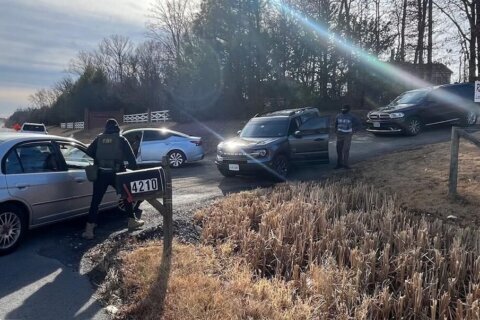This article was republished with permission from WTOP’s news partner InsideNoVa.com. Sign up for InsideNoVa.com’s free email subscription today.
This article was written by WTOP’s news partner InsideNoVa.com and republished with permission. Sign up for InsideNoVa.com’s free email subscription today.
Prince William County’s Racial and Social Justice Commission is poised to deliver its report to the Board of County Supervisors.
But behind the scenes, and sometimes publicly, commission members have filed dueling records requests and traded accusations and sharp words. And at least one commissioner is planning to present a minority report.
The panel will hold a work session Thursday to discuss a draft of its report ahead of a final vote next month.
The commission, created by the Board of County Supervisors in October 2020, is tasked with delivering a report that examines “the state of racial and social justice for people of color” in the county and making recommendations to the county government. Its initial focus is on policing, the provision of government services and public education.
In the past month, commissioners have been battling over an unsanctioned Oct. 6 town hall over critical race theory and culturally responsive teaching.
The town hall was held by Coles Commissioner Mac Haddow, Brentsville Commissioner London Steverson and Gainesville Commissioner Erica Tredinnick, each of whom was appointed by Republicans on the Board of Supervisors. Democrats appointed all the other commissioners.
Critical race theory is an overarching term applying to graduate-level law studies focusing on how issues of race are interwoven into U.S. history through government and private policies. The theory has become a battle cry among conservative groups, who say it is being taught in all levels of schooling and assigns the blame of past racist actions to current children.
Local and state school officials in Virginia have adamantly and consistently said the theory is not being taught and that people are conflating equity initiatives and culturally responsive teaching with critical race theory.
Haddow still feels it’s important to examine the potential use of the theory.
“Why would they be afraid of seeing whether or not there are rogue teachers teaching critical race theory?” he said.
Dueling requests
Before the October town hall, Chair Shantell Rock (Woodbridge) sent a news release to InsideNoVa and other local news outlets saying the event wasn’t sanctioned by the commission and that critical race theory is not in the panel’s purview. She sent a similar news release about a town hall planned Monday evening by School Board member Loree Williams.
Haddow has implied that the media outlets were chosen because they’re sympathetic to Rock, pointing out that television news stations that cover the area weren’t included on the release.
The town hall appeared to be a violation of the Virginia Freedom of Information Act’s meeting requirements because more than three members of the panel were present discussing public business. Haddow has said he informed county staff of the meeting, and they failed to post notice of it in a timely manner.
After the town hall, Alan Gloss, a frequent critic of the Board of Supervisors, filed a FOIA request seeking communications between commissioners concerning the town hall. Rock said that after the commission responded to the request, Haddow alleged that commissioners didn’t provide enough documents.
“At that point, I was like, `Did he put Mr. Gloss up to do this and if so, why?’” Rock said. ““I wanted to know if Commissioner Haddow had any connection to this.”
Rock then filed her own FOIA request, seeking communications between Haddow, Steverson, Tredinnick and Gloss regarding the town hall.
Rock has criticized Haddow for “constantly” filing FOIA requests of the commission, saying it is disrupting the panel’s work.
Haddow has filed at least eight requests to the commission or county staff since Feb. 5, according to documents obtained under FOIA by InsideNoVa.
Rock said her request was different from Haddow’s because it showed that Haddow, Steverson and Tredinnick had an electronic meeting to discuss logistics before the town hall.
“It clearly showed that the three commissioners did meet and they had a discussion about their town hall,” she said. “They clearly shut us out. We knew nothing about it. … It was beneficial in a way because we’ve got this report coming out and it kind of let me know … where everybody kind of stands.”
Rock said the meeting, held on Zoom, was a violation of FOIA, but Haddow disagreed because, he said, “We didn’t take any public action.”
Megan Rhyne, executive director of the Virginia Coalition for Open Government, said FOIA is triggered when three members of a government body meet. She said the circumstances of the meeting could make it tricky.
“One could argue that logistics aren’t public business, but the problem is that even if everyone is scrupulous and keeps completely focused on logistics and logistics only, the perception [because of the three-person limit] is going to be that there’s something else being discussed and that the public is being left out of it,” she said.
On Rock’s request for documents, Haddow said “I’m going to give the benefit of the doubt to Chairman Rock and say she was simply misguided on this.”
In response to Rock, Tredinnick said the chair was being hypocritical by filing the request.
“Hopefully these childish games end soon,” she wrote in an email to Rock. “As someone who stated the FOIA was just to delay the real work of the commission and then to make a FOIA request yourself…Chair Rock, it’s a little confusing that you want to delay the work of the commission as well? Very confusing.”
Minority report
Haddow says that since the commission’s inception, he has struggled to get the panel to focus on issues like achievement gaps in the schools caused by the COVID-19 pandemic.
Last month, county school administrators provided detailed data from the past school year. It showed very similar graduation rates (with 97.3% of white students graduating on time and 94.1% of Black students doing the same) but a widening gap on state standards-of-learning exams.
“What became clear to me at least from my perspective … was this did not appear to be a serious effort to examine the issues that impact communities of color in Prince William County,” Haddow said.
Haddow said he believes the final report will be lacking in data and “little or none of it will be evidence-based.”
“I think that the commission is going to deliver a product that is highly sanitized to the agenda that was set forth, a preconceived agenda that the commission is now determined they will provide and it will not, in my opinion, advance the issue for communities of color,” he said. “I don’t think that the public is going to get a fair view of what the state of systemic racism is in Prince William County.”
Haddow believes the county needs to improve diversity in the workforce of schools and county government, particularly in the police department. “That’s very troubling, but that doesn’t speak to systemic racism. It speaks to hiring practices that need to be improved moving forward.”
Rock believes Haddow will release a minority report after not supporting what is presented to the Board of Supervisors. She’s “still pretty confident” the commission will meet its goals but, asked whether she feels the three commissioners will undermine the report, Rock said “Honestly, yeah.”
“They really can’t do that,” Rock said. “They can’t do that as commission members, but they can do it as an individual citizen.”
Haddow does plan to produce some form of minority report, but said it will focus more on the process than the issues. “It’s not going to be a political document, in my opinion. It’s about the process.”
Haddow acknowledged that he plays a role in creating contention on the commission, but said it’s necessary to follow proper procedure. “I know that I’m a catalyst for some of these discussions because I choose to object. If I’m not forceful, I don’t get heard.”
Final report
Woodbridge Supervisor Margaret Franklin said some commissioners want to “dismantle” the panel.
“You have some commissioners who are desperately trying to do the work with which the commission has been tasked with while others are trying desperately to work against the goals of the commission,” she said. “It is disappointing that some people are so vindictive toward the idea of racial justice that they would want to see it dismantled.”
In an emailed statement, Coles Supervisor Yesli Vega said the county’s government “does not have an issue with racism.”
“From what I’ve seen on their fliers and public communications is that the commission appears to be begging county residents to validate its existence with requests for examples of racism within county government,” she wrote. “However, it doesn’t seem like they’ve received the feedback they either wanted or expected.”
Vega wrote that any “real patterns or clear and repeated examples of racism in county government” need to be addressed.
Vega predicted that preservation of the county’s rural area would be deemed “racist and exclusionary because of its demographics” and the commission would recommend “that we need to reduce the percentage of white people employed by county government.”
Vega also criticized the conduct in meetings, saying they “have been poorly run and in an inconsistent manner.” She called a potential recommendation to remove school resource officers as “dangerous.”
Although there have been “a bunch of distractions,” Franklin remains confident in the commission’s work.
“I think the goals and the mission of the commission will be achieved,” Franklin said. “I think the people who want to do the work and doing that and they’ll submit a report that reflects that. … I don’t know the specifics, but I do believe we are going to see some good recommendations.”







